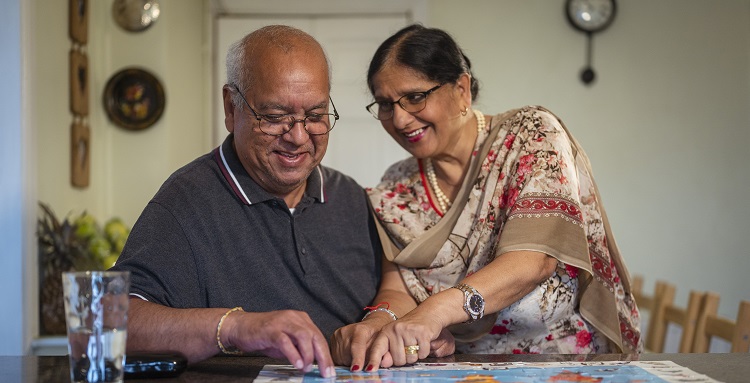)
The wider impact of care: (how) do community-based social care services support older carers?
Stacey Rand (University of Kent)
Social care has a much wider resonance beyond the direct service/ user dynamic, involving families, friends and often unpaid carers. Stacey Rand, Senior Research Fellow at the Personal Social Service Research Unit (PSSRU), University of Kent, shares insights from her work in this area.
Policy, research and practice tends to focus on the effect of community-based social care on the lives of adults with support needs. However, the wider impact of social care (the effect also on family and friends, especially unpaid carers) should be taken into account, both as a way of properly valuing care and a route to better supporting people.
This approach is summed up in this quote, from a family carer I spoke to:
“If we’re getting the right services, he’s happy and I’m happy. We’re all happy bunnies.”
This interest in the wider impact of care was developed in a brief discussion paper. This also led to a new project: the dyadic impact of social care (DYADS) study, which is due to complete in early 2023.
What is the ‘whole family’ or ‘dyadic outcomes’ approach?
The majority of UK family carers are aged between 45 and 65 years, but the fastest growing group of carers are those aged 65, or over. There are an estimated two million older carers in the UK, which doubled to 4 million during the early phase of the Covid-19 pandemic. These older carers are more likely to care for a spouse or partner, live with that person, engage in mutual caring (also known as co-caring) where each person supports the other but in different ways, and provide high-intensity support, sometimes 24/7. They contribute significantly to the estimated £135 billion worth of care provided by families in the UK, each year. Despite this, carers aged 65 or over remain relatively unrecognised in policy, research and practice.
In policy terms, this view of the wider impact of social care is referred to as the whole family approach. It is also sometimes referred to as dyadic (=of two people, in relationship; here, an adult with support needs and their carer).
In my research, I have explored both why we need to understand the effect of services on people’s lives (their quality of life, not just individually, but as a dyad) but also, how a view of the interpersonal aspects of care, especially between adults with support needs and carers.
The ‘dyadic’ impact of services
It is important to recognise the role of community-based social care (e.g. home care, day activities) in supporting not only adults with support needs, but older carers in their own right. Of course, you could say that this is common sense. Many of us, from personal experience, can think of older relatives, family and friends, who have come to rely on the care offered by another older person. And we may also be able to think of the ways in which services (e.g. home care) have helped the person who needs support to live better/well, but also how they have helped (or in some cases, hindered) the relative or friend trying to support.
Research supports this view. In a survey of carers in England, three quarters reported that community-based social care services improved their quality of life. This was both directly (i.e. through services for the carer) and also indirectly (i.e. through services for the person they care for). Only a small number (2%) reported that services had a negative effect on quality of life, e.g. by adding additional burden or creating more work.
People’s quality of life is also influenced directly by other factors (e.g. age, housing), outside of the direct influence of social care. Some of these factors are shared influences on the carer and the person they support. But there is also ‘mutual influence’, whereby the quality of life of one person directly affects another person, through their relationship and social interactions. Such mutual influence has been found for one aspect of social care-related quality of life, feeling in control of daily life. This is important as it shows the different way(s) in which quality of life can be influenced (i.e. by social care support, other factors, by shared environment and also through the caring relationship). It also highlights how we need to account for the relational aspects of care and also that the ‘wider impact’ of care, on both an adult with support needs and their carer(s), may support better outcomes.
Good quality, responsive community-based services play an important role in supporting adults with support needs and their carers, reducing the risk of adverse health and quality of life outcomes. There is a need for care policy and practice to consider both carers and the people they support, together, to ensure good outcomes and to make sure that the true wider value of social care is considered.
Dr Stacey Rand is a Senior Research Fellow in social care at the Personal Social Services Research Unit (PSSRU), University of Kent.
Citation
S Rand (2023) The wider impact of care: (how) do community-based social care services support older carers?, NIHR School for Social Care Research Blog, 16 January 2023
Read NIHR Social Care Speciality posts here →




